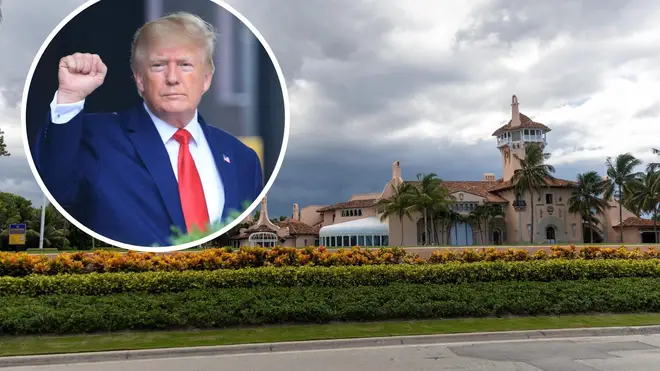
Clive Bull 1am - 4am
26 August 2022, 19:35 | Updated: 26 August 2022, 19:39

Fourteen of the 15 boxes recovered from former US president Donald Trump's Florida estate earlier this year contained documents with classification markings, according to an FBI affidavit.
The US Department of Justice released the court papers - known as an affidavit - that convinced a judge to authorise the search of Donald Trump's estate in Mar-a-Lago, Florida, to explaining the justification for the search of the property.
The FBI search on August 8 was part of an investigation into the potential mishandling of documents which were taken to the former president's home.
The redacted 32-page affidavit shows 15 boxes received from Mar-a-Lago in January contained “a lot of classified records” mixed in with newspapers and magazines.
The papers show the volume of sensitive government documents located at Mar-a-Lago and reveals FBI concerns that the records were being retained illegally.
Federal officials redacted significant portions of it to protect the identity of witnesses and to avoid revealing sensitive investigative tactics.
"The government is conducting a criminal investigation concerning the improper removal and storage of classified information in unauthorised spaces, as well as the unlawful concealment or removal of government records," an FBI agent wrote on the first page of the affidavit in seeking a judge's permission for a warrant to search the property.
The affidavit does not provide new details about the 11 sets of classified records recovered during the August 8 search at Mar-a-Lago but instead concerns a separate batch of 15 boxes that the National Archives and Records Administration retrieved from the home in January.
According to the affidavit, officials located 184 documents bearing classification markings, including 25 documents marked as top secret.
Agents who inspected the boxes found markings related to information provided by confidential human sources as well as information related to the Foreign Intelligence Surveillance Act.
Taken together, the affidavit reveals additional details about an ongoing criminal investigation that has brought fresh legal peril for Mr Trump just as he lays the groundwork for another presidential run.
It also shows the volume of sensitive government documents that were stored at Mar-a-Lago instead of being turned over to the National Archives.
Affidavits typically contain vital information about an investigation, with agents spelling out the justification for why they want to search a particular property and why they believe they are likely to find evidence of a potential crime there.
But affidavits routinely remain sealed during pending investigations, making the judge's decision to reveal portions of it all the more striking.
In an acknowledgment of the extraordinary public interest in the investigation, US Magistrate Judge Bruce Reinhart on Thursday ordered the department by Friday to make public a redacted version of the affidavit.
The directive came hours after federal law enforcement officials submitted under seal the portions of the affidavit that they want to keep secret as their investigation moves forward.
The redactions proposed by the Justice Department are extensive given the sensitivity of the investigation, lessening the likelihood that the document will offer a comprehensive look at the basis for the unprecedented search or significant insights about the direction of the probe.
Documents previously made public show the FBI retrieved from the property 11 sets of classified documents, including information marked at the top secret level.
They also show that federal agents are investigating potential violations of three federal laws, including one that governs gathering, transmitting or losing defence information under the Espionage Act.
The other statutes address the concealment, mutilation or removal of records and the destruction, alteration or falsification of records in federal investigations.
Judge Reinhart, acknowledging the extraordinary public interest in the investigation, said last week that he was disinclined to keep the entire document sealed and told federal officials to submit to him in private the redactions it wanted to make.
In his order, the judge said the department had made compelling arguments to leave sealed broad swathes of the document that, if disclosed, would reveal grand jury information; the identities of witnesses and "uncharged parties"; and details about the investigation's "strategy, direction, scope, sources and methods".
But he also said he was satisfied "that the government has met its burden of showing that its proposed redactions are narrowly tailored to serve the government's legitimate interest in the integrity of the ongoing investigation and are the least onerous alternative to sealing the entire affidavit".